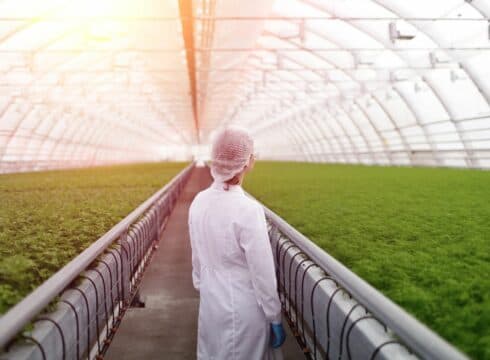Digitization in food production, coupled with eco-friendly approaches are inducing changes in the production of food
Food must be high quality and therefore we see stringent regulations in the F&B industry
F&B companies must look for new ways to improve their products and services to counter impacts of the green movement, climate change and growth of competition
Inc42 Daily Brief
Stay Ahead With Daily News & Analysis on India’s Tech & Startup Economy
When we think about food, we rarely give a thought on how technology and food production can be synchronized. However disseminated these two industries may sound, with rising demand, technology has recently evolved to play a key role in food and beverage space. Innovation in technology allows for quicker food production, making products affordable with superior quality.
How The Food And Beverage Industry Is Evolving?
The world around us is fast, and that has had an impact on what we eat. Digitisation in food production, coupled with eco-friendly approaches are inducing changes in the production of food. This is primarily driven by the following three factors:
Increasing Demand For Healthy Food
Food must be high quality and therefore we see stringent regulations in the F&B industry. Manufacturing businesses must ensure they provide clean and healthy food to continue improving brand image. To complement that, according to a recent survey, 43% of customers are looking for more healthy food while 18% are interested in eco-friendly products.
Climate Change
All of us are concerned about rapidly changing climate conditions and have started to engage in conversations regarding food preservation. Numerous consumers today choose plant-based diets and expect more sustainability from manufacturers. This can be viable only with digital transformations.
Increased Necessity For Reduction In Plastic Waste
A growing worldwide trend is using plastic-free straws, cups, and plates. In some countries, plastic cutlery is banned altogether. What is next? F&B companies should adapt their packaging accordingly and come up with alternative solutions for packaging systems. When the old methods do not work, the digital world comes to rescue.
How Can Technology Help?
Robotics
Many tech devices are aimed at making food production quicker and safer. With robots, everyday tasks can be made easier. In 2016, the largest meat processing company in the world, JBS, first tried out “robot butchers” that could cut the most difficult sections of the meat very precisely. Butchers cutting these more challenging pieces of meat certainly makes their job more dangerous, but robots have created a safer environment and reduced the risk of injuries.
Drones
Used in the agriculture industry, some companies have started to use drones to provide products of the highest quality. Drones get a general overview of the field from above and then test both the soil and crops. These small helpers deliver information to the farmworkers and help them identify crops that are damaged. As a result, it saves lots of time, helps grow only high-quality crops, and improves workers’ productivity.
Eco-Friendly Waste And Packaging
Brands have no other choice but to follow this trend of eco-friendly packaging. With the latest technical developments, there is edible packaging with zero waste and micro packaging which has nanoparticles that even kill bacteria. Product waste can be countered as well, an example is the Copia app which connects shops and restaurants that have a surplus in available food with numerous nonprofit organizations that are happy to accept it.
Sensors
Sensors can be used to count inventory helping the manager become more efficient. Some smart sensors convert data from the production process into digital data and provide managers with priceless insights. In addition, this happens real-time so that critical items that may cause downtimes can be distinguished.
AI-Based Solutions
Some AI based solutions help in assessment of products that need to be produced in a day, week, or month. An accurate forecast for companies of any size can be obtained using AI-powered solutions and big data with real-time updates.
The Consulting Edge – What Food Businesses Must Evaluate?
With the constant value evolution that consumers seek in food and beverages, manufacturers and retailers need to find new ways to differentiate their offerings, maintain growth and stay ahead of the competition. To do that, food businesses must constantly self-evaluate or seek advice on:
- How to segment customers based on their eating habits, also additionally considering occasions and needs? This could also be demographic segmentation to align production and dispatch.
- What could be a significant value proposition to delight customers and foster loyalty?
- How to determine new products, channels or services that can be introduced for pursuing growth and diversification? In line with that, how does the business stand up for future growth.
- A refined and robust digital and ecommerce strategy for quicker, better and more impactful consumption
- Price assessments as compared to other sellers and based on inflation and other economic indicators
- Bottomline improvement by better utilising resources and bring cost-effectiveness through operational optimization
- Acquisition strategy in case there arises an opportunity
F&B companies must look for new ways to improve their products and services to counter impacts of the green movement, climate change and growth of competition. Legacy methods will not work alone as they cannot provide the highest levels of transparency, quality and storage of food products. Instead, businesses must seek consulting advice and choose the latest tech innovations to complement this evolving necessity.
{{#name}}{{name}}{{/name}}{{^name}}-{{/name}}
{{#description}}{{description}}...{{/description}}{{^description}}-{{/description}}
Note: We at Inc42 take our ethics very seriously. More information about it can be found here.


